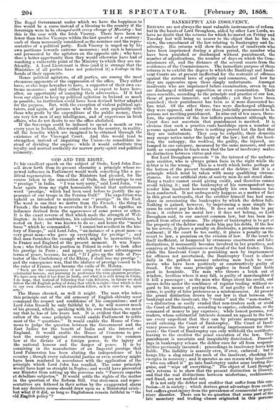GOD AND THE RIGHT.
IN his excellent speech on the subject of Oude, Lord John Rus- sell drew forth from its present obscurity a principle whose re- newed influence in Parliament would work something like a po- litical regeneration. One of the Ministers had pleaded, for the course taken in the annexation of Oude, the advantage to our " prestige " in India. " I was very sorry," said Lord John, " to hear again from my right honourable friend that unfortunate word prestige,' which had been used before to justify the ap- pearance of our troops in the Persian Gulf." The expedition was upheld as intended to maintain our " prestige" in the East. The word is one that we derive from the French ; the thing is French ; the tendency to overvalue it is French. It signifies an influence derived from the appearance of some power or other. It is the exact reverse of that which made the strength of Wel- lington : in his combinations, his calculations, his providence, he rested on fact ; he was known to do so ; and hence the "moral force " which he commanded. " I cannot but recollect in the his- tory of Europe," said Lord John, " an instance of a great man—a very great man—who gave up everything for prestige " ; and that man furnishes the example which might be instructive both to France and England at the present moment. It was Napo- leon ; who forfeited his position in Poland in order to look after his prestige in Paris ; andagain rejected most advantageous terms of peace, because, he said, " If I give up the title of Pro- tector of the Confederacy of the Rhine, I shall lose my prestige " : and the consequence was, that the idolizer of prestige ceased to be the ruler of France, and became the exile of St. Helena.
"Such are the consequences of not caring for substantial reputation, substantial honour, and pursuing in preference the vain phantom prestige. We have seen what it has done in India, and what it is still doing in China. I do hope, that instead of following that vain delusion, in future we shall follow the old English policy of doing that which is right—that which is due to our own character, and let reputation follow, as it is sure to do, upon sets."
The House cheered, as well it might. The man who takes this principle out of the old armoury of English chivalry must command the respect and confidence of his companions ; and if Lord John Russell be only faithful to it, he will recover much of his ground, which; speaking with his own frankness, we must say that he has of late years lost. It is evident that the appli- cation of the same principle would enable Parliament to settle most of the " questions." It would enable the House of Com- mons tojudge the question between the Government and the East Indies for the benefit of India and the interest of England. It would enable the House of Commons to pro- tect the country against encroachment upon its common law at the dictate of a foreign power, to the injury of the national honour and the danger of peace. It is by conniving in the manufacture of an Imperial prestige that Lord. Palmerston has been abating the independence of his country ; though every substantial justice or even courtesy might have been rendered in accordance with the application of the principle -which Lord John has recalled. The same principle would have kept us straight in Naples ; and would have prevented our Minister from setting up the perverse rule " Parcere superbis at debellare subjectos.' It would settle the rights of the matter in the question of the Reform Bill. Our statesmen and repre- sentatives are fettered in their action by the exaggerated alarm lest any decisive course should draw upon us a Ministerial crisis : but what if it did, so long as Englishmen remain faithful to "the old English policy"?


































 Previous page
Previous page